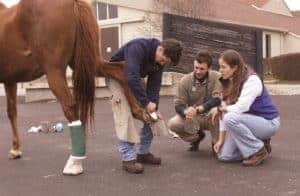Local Beliefs
- Topics: Working With Morocco's Horses
I have wanted to write a little bit about the animal trading, donating, etc that goes on here at the Fondouk. The perfect opportunity presented itself today in the form of one very funny situation. This one had us all laughing pretty hard. A couple of weeks ago, a man dropped off his mule for a hernia repair. Being very poor and in need of a mule to continue to work and support his family, he borrowed a mule from the Fondouk (the Fondouk occasionally keeps and cares for abandoned or unwanted healthy animals, to be given or loaned to individuals in need). Well, today the same man came back to the Fondouk with a completely different mule that had a wound he wanted us to look at. We asked him where the loaner mule was. As it turns out, he traded the Fondouk’s mule for the one he brought in today (who knows for what reason–maybe the other one didn’t work hard enough). We all laughed for a while; you have to have a sense of humor about this stuff. When we demanded that he "undo" the trade and bring back the same mule that the Fondouk loaned him, he told us that would be impossible because the person he traded the mule to is a butcher! If he was really being honest, maybe the motive was that the Fondouk had fed the mule enough to make it attractive as a food animal. In any case, whether he was trying to put one over on the Fondouk or not, his mule that we originally performed the hernia repair on is not yet ready to return to work. I suppose we’ll sort it all out if he does come back to get his original mule.
The Fondouk’s attitude about situations like this is one of understanding; I don’t suppose you can blame such poor people for doing anything they can to survive. There are some people, though, who take advantage of the Fondouk by dropping off an animal for care, and then not returning to pick up the animal until they need it again for work, which might be months later, during a harvesting season. Those people are opportunists who know that their animal will be well cared for and fed to gain weight during their time at the Fondouk.
Today was pretty slow case-wise. We have some exciting things in the works. We’re planning on going to see the animal souk (market) tomorrow. It will be an early one–people arrive from everywhere as early as 2:30 in the morning to do business. We probably won’t partake in the festivities quite that early, but we’ll try to see the souk before 6 a.m., when the market is at its busiest. Also we might be heading to Rabat this weekend for a horse show. I’m looking forward to comparing that event to the ones I’ve seen in the states. We also might get to see an event known as Fantasia–a type of contest of skill on horseback which involves up to thousands of riders separated into teams by their hometown and firing rifles (hopefully not at each other). I’d love to learn more about this activity; it will definitely make for a great blog entry if all goes as planned!
Houssine explained to me an interesting belief that the Moroccans have. I was talking to him about castrating practices here. For one, hardly anyone castrates any animal. I noticed early on that we don’t see any gelding horses. The horse folks here must be pretty seasoned stallion handlers, as I’ve seen people (wearing sandals) walk into the Fondouk leading two stallions side by side, neither wearing more than a very thin rope halter and tiny lead rope. My conversation with Houssine turned toward the mules, which are routinely castrated despite being born infertile. The reasoning behind this can only be described as puzzling. Apparently, people hold the belief that if a mule were to mount a filly or mare (horse), then that filly or mare would become infertile. How does one respond to a statement like that? That is just one example of some of the beliefs that are rampant around here, but that will most likely never be changed because they are stubbornly perceived as absolute truth, having been passed down for generations
Create a free account with TheHorse.com to view this content.
TheHorse.com is home to thousands of free articles about horse health care. In order to access some of our exclusive free content, you must be signed into TheHorse.com.
Start your free account today!
Already have an account?
and continue reading.
Written by:
Jeremy Campfield
Related Articles
Stay on top of the most recent Horse Health news with









